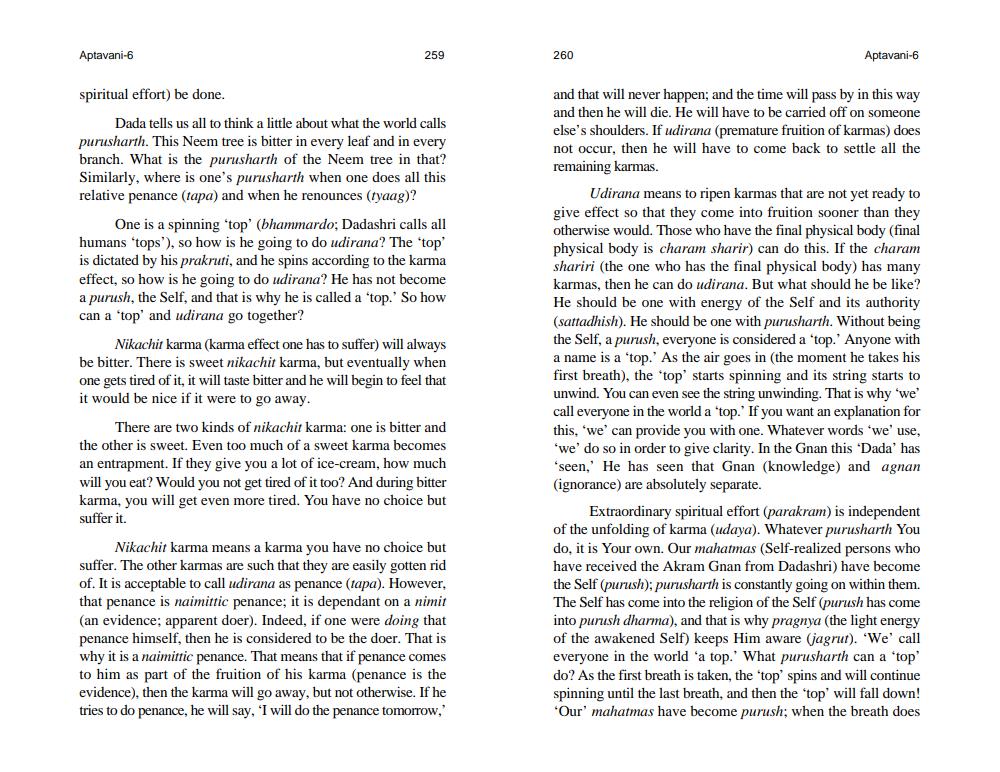________________
Aptavani-6
259
260
Aptavani-6
spiritual effort) be done.
Dada tells us all to think a little about what the world calls purusharth. This Neem tree is bitter in every leaf and in every branch. What is the purusharth of the Neem tree in that? Similarly, where is one's purusharth when one does all this relative penance (tapa) and when he renounces (tyaag)?
One is a spinning 'top' (bhammardo; Dadashri calls all humans "tops'), so how is he going to do udirana? The 'top' is dictated by his prakruti, and he spins according to the karma effect, so how is he going to do udirana? He has not become a purush, the Self, and that is why he is called a 'top.' So how can a 'top' and udirana go together?
Nikachir karma (karma effect one has to suffer) will always be bitter. There is sweet nikachit karma, but eventually when one gets tired of it, it will taste bitter and he will begin to feel that it would be nice if it were to go away.
and that will never happen; and the time will pass by in this way and then he will die. He will have to be carried off on someone else's shoulders. If udirana (premature fruition of karmas) does not occur, then he will have to come back to settle all the remaining karmas.
Udirana means to ripen karmas that are not yet ready to give effect so that they come into fruition sooner than they otherwise would. Those who have the final physical body (final physical body is charam sharir) can do this. If the charam shariri (the one who has the final physical body) has many karmas, then he can do udirana. But what should he be like? He should be one with energy of the Self and its authority (sattadhish). He should be one with purusharth. Without being the Self, a purush, everyone is considered a 'top. Anyone with a name is a 'top' As the air goes in the moment he takes his first breath), the 'top' starts spinning and its string starts to unwind. You can even see the string unwinding. That is why 'we' call everyone in the world a top.' If you want an explanation for this,'we can provide you with one. Whatever words 'we' use, 'we' do so in order to give clarity. In the Gnan this 'Dada' has 'seen,' He has seen that Gnan (knowledge) and agnan (ignorance) are absolutely separate.
Extraordinary spiritual effort (parakram) is independent of the unfolding of karma (udaya). Whatever purusharth You do, it is Your own. Our mahatmas (Self-realized persons who have received the Akram Gnan from Dadashri) have become the Self (purush); purusharth is constantly going on within them. The Self has come into the religion of the Self (purush has come into purush dharma), and that is why pragnya (the light energy of the awakened Self) keeps Him aware (jagrut). 'We' call everyone in the world 'a top.' What purusharth can a 'top' do? As the first breath is taken the top spins and will continue spinning until the last breath, and then the 'top' will fall down! "Our' mahatmas have become purush, when the breath does
There are two kinds of nikachit karma: one is bitter and the other is sweet. Even too much of a sweet karma becomes an entrapment. If they give you a lot of ice-cream, how much will you eat? Would you not get tired of it too? And during bitter karma, you will get even more tired. You have no choice but suffer it.
Nikachit karma means a karma you have no choice but suffer. The other karmas are such that they are easily gotten rid of. It is acceptable to call udirana as penance (tapa). However, that penance is naimistic penance; it is dependant on a nimit (an evidence; apparent doer). Indeed, if one were doing that penance himself, then he is considered to be the doer. That is why it is a naimistic penance. That means that if penance comes to him as part of the fruition of his karma (penance is the evidence), then the karma will go away, but not otherwise. If he tries to do penance, he will say, 'I will do the penance tomorrow,




